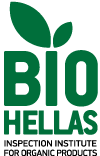Organic Agriculture in Greece

Investing and growing in a sustainable, climate-neutral Europe by 2050 is now the primary aim of the EU’s agenda, fueled by the European Green Deal.
By strengthening farmers’ efforts to tackle climate change, protect the environment, and preserve biodiversity, the Green Deal emphasizes the importance of organic production for a sustainable food production system.
In order to fight crop pests and diseases, preventive measures are taken on the one hand (cultivating a suitable variety, rotating crops, maintaining and/or enhancing natural enemies, suitable cultivation techniques, etc.). On the other hand, legislation which governs the production of organic products allows the use of appropriate non-chemical plant protection products, such as copper, sulfur preparations, natural insecticides, the use of microorganisms, or substances produced by microorganisms. Among the methods for controlling weeds, you can treat the soil, use a crop rotation program, use a destroyer, or use flames. It is forbidden to apply herbicides.
A diet based on organic feed is fed to the animals, while hormones and synthetic chemicals are prohibited for rapid growth. A special emphasis is placed on the welfare of the animals, providing pastures for them and restricting their overcrowding in small stables.
In terms of processed foods, they must be made using organic ingredients, and chemical additives, preservatives, colorings, flavour enhancers, etc. are prohibited.
The farm or herd must, however, have used the organic cultivation or breeding method for a certain period of time before a product can be classified as organic. For example, tree crops can be converted for up to three years, or the conversion period can be extended even further if needed. A parcel or herd’s status changes from “conventional” to “organic” during this time, which is why it is also called the “conversion period”. The purpose of this period is to ensure that pesticide residues, chemical fertilizers, antibiotics, and so on, are removed from the farm or product.
To produce organic products, the company must use certified organic raw materials and additives that have been approved by law. Whenever organic and conventional products are produced in parallel within the same facilities, the company should take all necessary steps to separate conventional and organic products. In other words, it means complete and documented separation of products at every stage of the production process (from receiving raw materials to processing and disposing of finished products).
Organic production methods apply to the following activities:
- Plant Production – Production on the estate
- Mushroom Production
- Animal Production – Production in the stable
- Beekeeping
- Fish farms
- Collection of Wild Plants and Herbs
- Algae Collection
- Food Trading Processing Standardization
Marketing of animal feeds and processing standardization:
- Production Standardization Trade of other products referred to in article 2 par. 1 CAN (EU) 848/2018:
- Yeast used as food or animal feed
- Pâté, sweet corn, vine leaves, palm hearts, hop shoots and other similar edible parts of plants and products derived from them
- Sea salt and other salts for food and animal feed
- Silkworm cocoon suitable for unwinding its fibers
- Natural gums and resins
- Beeswax
- Essential oils
- Stoppers of natural cork, not agglomerated, and without any binding agents
- Cotton, not carded or combed
- Wool, not carded or combed
- Raw hides and skins that have not been treated
- Traditional herbal preparations of plant origin
- Import of Organic Products from countries outside the European Union (third countries)
In each of the above areas, companies can operate either separately or in combination.



